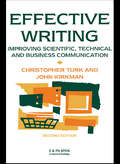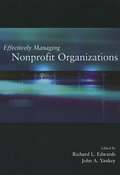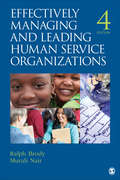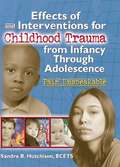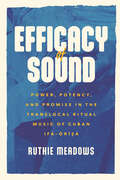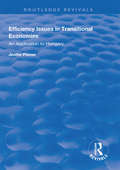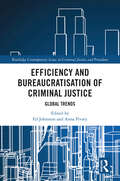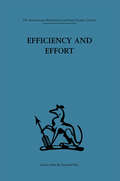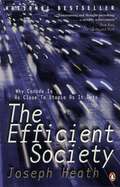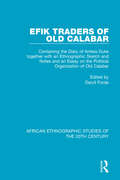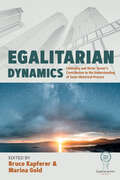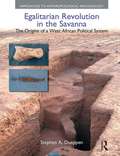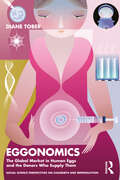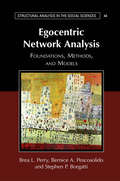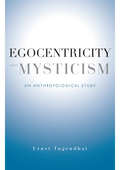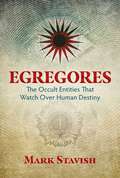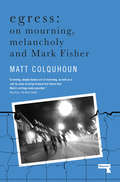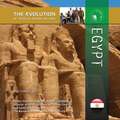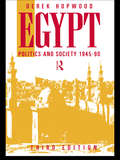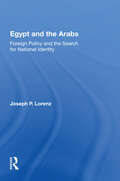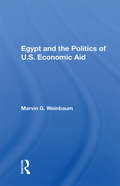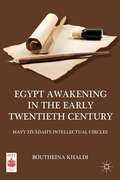- Table View
- List View
Effective Writing: Improving Scientific, Technical and Business Communication
by John Kirkman Christopher TurkEffective communication is vital to science, engineering and business management. This thoroughly updated second edition with a new chapter on the use of computers and word-processors gives clear, practical advice illustrated with real-life examples on how to select, organize and present information in reports, papers and other documents.
Effectively Managing Nonprofit Organizations
by Richard L. Edwards John A. YankeyEdwards (social work, Rutgers) and Yanky (family and child welfare, Case Western Reserve U. ) present a revision and expansion of two earlier books, Skills for Effective Human Services Management (1991) and Skills for Effective Management of Nonprofit Organizations (1998). Featuring contributions from 31 American academics, consultants, and nonprofit professionals, the text offers nonprofit managers a guide to the skills and competencies needed to lead today's nonprofit organizations successfully. The text is organized around the "competing values framework," a meta-theoretical model of organizational and managerial effectiveness. Coverage includes an overview of the framework followed by sections on its four skill areas--boundary-spanning, human relations, coordinating, and directing--and discussion of the skills needed to manage in turbulent times. For mid- and upper-level managers, and students of nonprofit or public management. Annotation ©2007 Book News, Inc., Portland, OR (booknews.com)
Effectively Managing and Leading Human Service Organizations (SAGE Sourcebooks for the Human Services)
by Ralph Brody Murali D NairNow in its Fourth Edition, Effectively Managing and Leading Human Service Organizations continues to provide invaluable creative ideas for achieving managerial success. Authors Ralph Brody and Murali Nair dissect and diagnose common workplace dilemmas, offering current and future managers the skills to implement positive changes in organizations large and small. Easy-to-read, this book connects a conceptual framework and essential managerial practices with hundreds of real-life examples and case studies of applied managerial skills in organizational settings.
Effects of Financial Globalization on Developing Countries: Some Empirical Evidence
by Shang-Jin Wei Kenneth Rogoff Eswar S. Prasad M. Ayhan KoseThis paper reviews recent empirical evidence, including some new research, on the effects of financial globalisation for developing countries. It focuses on three issues: whether financial globalisation promotes economic growth in developing countries; the impact on macroeconomic volatility in these countries; and factors that can help to harness the benefits of financial globalisation.
Effects of and Interventions for Childhood Trauma from Infancy Through Adolescence: Pain Unspeakable
by Sandra HutchisonSuccessfully reach out and help children through the worst times of their young lives! Effects of and Interventions for Childhood Trauma from Infancy Through Adolescence: Pain Unspeakable explores an array of trauma-related topics pertaining to children of all ages from a variety of cultures and countries. This book covers the various ego stages of child development and addresses how each one is affected by traumatic experiences. This easy-to-read resource serves as a readily available reference for caregivers-professional or otherwise-who work with or encounter a child who has been traumatized. In Effects of and Interventions for Childhood Trauma from Infancy Through Adolescence, you&’ll find actual accounts of traumatic incidents throughout the world, focused specifically on those incidents that have the most devastating impact on large groups of children. This book reviews the research on post-traumatic stress disorder and stress-response related symptoms with brief descriptions of treatments for you to use with children who suffer from posttraumatic stress. Special features of this important tool consist of with an extensive list of organizations and crisis hotline numbers as well as recommended reading, video, and curricula resources. Effects of and Interventions for Childhood Trauma from Infancy Through Adolescence examines traumatic situations from many angles, including: the many faces of trauma-accidents, fire, natural disasters developmental considerations, including ego development, memory development, and the development of fears and responses the way children respond to traumatic incidents the types of interventions-individual, group, family, pharmacological, and school-based cultural considerations from around the globe how to establish a school-based Trauma Response Team Effects of and Interventions for Childhood Trauma from Infancy Through Adolescence includes real case studies, fictional sample cases, and suggestions that walk you step-by-step through the possible scenarios that can occur with children during or after a traumatic event. Each section of the book ends with a helpful summary highlighting the most important information.
Efficacy of Sound: Power, Potency, and Promise in the Translocal Ritual Music of Cuban Ifá-Òrìsà (Chicago Studies in Ethnomusicology)
by Ruthie MeadowsThe first book-length ethnographic study on music and Ifá divination in Cuba and Nigeria. Hailing from Cuba, Nigeria, and various sites across Latin America and the Caribbean, Ifá missionary-practitioners are transforming the landscape of Ifá divination and deity (òrìṣà/oricha) worship through transatlantic travel and reconnection. In Cuba, where Ifá and Santería emerged as an interrelated, Yorùbá-inspired ritual complex, worshippers are driven to “African traditionalism” by its promise of efficacy: they find Yorùbá approaches more powerful, potent, and efficacious. In the first book-length study on music and Ifá, Ruthie Meadows draws on extensive, multisited fieldwork in Cuba and Yorùbáland, Nigeria, to examine the controversial “Nigerian-style” ritual movement in Cuban Ifá divination. Meadows uses feminist and queer of color theory along with critical studies of Africanity to excavate the relation between utility and affect within translocal ritual music circulations. Meadows traces how translocal Ifá priestesses (ìyánífá), female batá drummers (bataleras), and priests (babaláwo) harness Yorùbá-centric approaches to ritual music and sound to heighten efficacy, achieve desired ritual outcomes, and reshape the conditions of their lives. Within a contentious religious landscape marked by the idiosyncrasies of revolutionary state policy, Nigerian-style Ifá-Òrìṣà is leveraged to transform femininity and masculinity, state religious policy, and transatlantic ritual authority on the island.
Efficiency Issues in Transitional Economies: Application to Hungary (Routledge Revivals)
by Jenifer PiessePublished in 1999, this text uses a number of approaches to measure the performance of firms in the transition economies of Central Eastern Europe during the early stages of reform. There is considerable controversy about the level of productivity in this period, as is evident by contradictory evidence quoted in the literature and a high degree of inconsistency in published national statistics. Indeed, the disagreement extends to the measurement approach and the results for this group of countries. Particularly difficult is any analysis at the firm level, as data is inconsistent, incomplete and based on now out-dated accounting systems. The information used in this book is a panel data set of 64 items collected from 1000 firms across 25 industry sectors in Hungary. Productive efficiency is measured and the reasons for poor performance are discussed. It was found that industrial sectors differ in their average performance levels and in the factors most likely to account for this. Finally, recommendations are developed to help to reverse the decline in productivity.
Efficiency and Bureaucratisation of Criminal Justice: Global Trends (Routledge Contemporary Issues in Criminal Justice and Procedure)
by Ed Johnston and Anna PivatyThis book tackles the growing issues concerning the managerialism and bureacratisation of criminal justice systems across a number of jurisdictions. Here, managerialism means the move towards more standardised, bureaucratic and efficiency-driven systems, influenced by a desire to ensure predictability, control risks and, ultimately, economic savings via a more efficient process. The volume explores the phenomenon of managerialism in selected national criminal legal systems, covering all stages of criminal case processing from arrest to the imposition of sanction. The selected countries represent diverse socio-economic, political, cultural and legal traditions including common law, civil law, mixed common and civil law and post-Soviet tradition. The book engages with a variety of relevant theoretical concepts, such as fairness, rationality, efficiency and legitimacy. The authors critically examine whether and to what extent the trend towards managerialism is indeed discernible, and what are its likely effects in the given national criminal legal systems. The book will be of interest to students, researchers and practitioners working in the areas of comparative criminal justice and procedure.
Efficiency and Effort: An analysis of industrial administration
by W BaldamusTavistock Press was established as a co-operative venture between the Tavistock Institute and Routledge & Kegan Paul (RKP) in the 1950s to produce a series of major contributions across the social sciences. This volume is part of a 2001 reissue of a selection of those important works which have since gone out of print, or are difficult to locate. Published by Routledge, 112 volumes in total are being brought together under the name The International Behavioural and Social Sciences Library: Classics from the Tavistock Press. Reproduced here in facsimile, this volume was originally published in 1961 and is available individually. The collection is also available in a number of themed mini-sets of between 5 and 13 volumes, or as a complete collection.
Efficient Society
by Joseph HeathIn this fascinating account of what makes Canada such a successful society, Joseph Heath celebrates the much-maligned value of efficiency and asks some searching questions about the forces that threaten to undermine our quality of life. Canada is an efficient society, much more efficient than our neighbour to the south, where personal liberty takes precedence over collective well-being. This is one of the reasons, Heath argues, that the United Nations Annual Human Development Report consistently ranks Canada as the best place in the world to live. But this efficiency is under siege. Can we resist the allure of short-sighted tax cuts? Can we maintain our quality of life in the face of relentless pressure to increase our productivity - both at work and at home? This is a profound and important look at how government and business conspire to improve our lives - and at the dramatic changes that will decide our social and economic future.
Efficient Society Why Canada Is As Close To Utopia As It Gets
by Joe HeathIn this fascinating account of what makes Canada such a successful society, Joseph Heath celebrates the much-maligned value of efficiency and asks some searching questions about the forces that threaten to undermine our quality of life. Canada is an efficient society, much more efficient than our neighbour to the south, where personal liberty takes precedence over collective well-being. This is one of the reasons, Heath argues, that the United Nations Annual Human Development Report consistently ranks Canada as the best place in the world to live. But this efficiency is under siege. Can we resist the allure of short-sighted tax cuts? Can we maintain our quality of life in the face of relentless pressure to increase our productivity - both at work and at home? This is a profound and important look at how government and business conspire to improve our lives - and at the dramatic changes that will decide our social and economic future.
Efik Traders of Old Calabar: Containing the Diary of Antera Duke together with an Ethnographic Sketch and Notes and an Essay on the Political Organization of Old Calabar
by Daryll FordeOriginally published in 1956 this book contains extracts of the 18th century diary of an Efik chief and documents the activities of slave-traders, the rituals of the Egbo society and many details of domestic life of among the Efik. This volume includes an English translation to the diary which was originally written in Pidgin. .
Egalitarian Dynamics: Liminality, and Victor Turner’s Contribution to the Understanding of Socio-historical Process (Egalitarianism #2)
by Bruce Kapferer Marina GoldLiminality: the state of being ‘betwixt and between’ is one of anthropology’s most influential concepts. This volume reconsiders Victor Turner’s innovative extension of Arnold Van Gennep’s concept of liminality from within the Manchester tradition of Social Anthropology established by Max Gluckman. Turner’s work was grounded in ethnography and engaged with philosophical perspectives in varied socio-historical contexts, extending well-beyond the confines of the anthropology that initially inspired much of his work. Liminality has therefore become a concept with broad interdisciplinary reach. Engaging with topical issues across the globe – from neuroscience to open access publishing and refugee experiences in Europe – this volume launches Turner’s fundamental work into the future.
Egalitarian Revolution in the Savanna: The Origins of a West African Political System (Approaches to Anthropological Archaeology)
by Stephen A. DueppenMany West African societies have egalitarian political systems, with non-centralised distributions of power. 'Egalitarian Revolution in the Savanna' analyses a wide range of archaeological data to explore the development of such societies. The volume offers a detailed case study of the village settlement of Kirikongo in western Burkina Faso. Over the course of the first millennium, this single homestead extended control over a growing community. The book argues that the decentralization of power in the twelfth century BCE radically transformed this society, changing gender roles, public activities, pottery making and iron-working. 'Egalitarian Revolution in the Savanna' will be of interest to students of political science, anthropology, archaeology and the history of West Africa.
Eggonomics: The Global Market in Human Eggs and the Donors Who Supply Them (Social Science Perspectives on Childbirth and Reproduction)
by Diane M. ToberWhat happens when people are reduced to products? By pulling back the clinical curtain on the multi-billion-dollar per year global egg industry, that is the central question Eggonomics seeks to address. Tracing the emotional and physical journeys egg donors embark upon as suppliers of valuable commodities, this book reveals uncomfortable realities at the heart of the industry. Donors — and the eggs they provide — are absolutely essential to helping others create the families of their dreams. But not all clinics treat their donors as well as their paying patients, and many donors suffer as a result. Technological innovations allow the egg donation industry to expand, fueling the private equity incursion into fertility medicine, turning once-private clinics into highly profitable, multinational conglomerates. Drawing upon international anthropological fieldwork, Eggonomics reveals the clinical spaces where egg donor’s bodies are tested, prodded, and poked for ever-increasing sums of profit, eugenic forces drive donor selection, and the unrelenting pressures of global capitalism threaten medicine’s prime directive of ‘do no harm.’ Timely, meticulously researched, and written with surgical precision, Eggonomics is a crucial read for researchers, medical professionals, policymakers, and anyone considering becoming or using an egg donor.
Egil's Saga
by Bernard Scudder Svanhildur ÓskarsdóttirEgil’s Saga tells the story of the long and brutal life of tenth-century warrior-poet and farmer Egil Skallagrimsson: a morally ambiguous character who was at once the composer of intricately beautiful poetry, and a physical grotesque capable of staggering brutality. The saga recounts Egil’s progression from youthful savagery to mature wisdom as he struggles to avenge his father’s exile from Norway, defend his honour against the Norwegian King Erik Bloodaxe, and fight for the English King Athelstan in his battles against Scotland. Exploring issues as diverse as the question of loyalty, the power of poetry, and the relationship between two brothers who love the same woman, Egil’s Saga is a fascinating depiction of a deeply human character.
Egocentric Network Analysis: Foundations, Methods, and Models (Structural Analysis in the Social Sciences #44)
by Bernice A. Pescosolido Brea L. Perry Stephen P. BorgattiEgocentric network analysis is used widely across the social sciences, especially in anthropology, political science, economics, and sociology, and is increasingly being employed in communications, informatics, and business and marketing studies. Egocentric network analysis requires a unique set of data collection and analysis skills that overlap only minimally with other network methodologies. However, until now there has been no single reference for conceptualizing, collecting, and analyzing egocentric social network data. This comprehensive guide to study design, data collection, and analysis brings together the state of knowledge with the most effective research tools to guide newcomers to this field. It is illustrated with many engaging examples and graphics and assumes no prior knowledge. Covering the entire research process in a logical sequence, from conceptualizing research questions to interpreting findings, this volume provides a solid foundation for researchers at any stage of their career to learn and apply ego network methods.
Egocentricity and Mysticism: An Anthropological Study
by Ernst TugendhatIn Egocentricity and Mysticism, Ernst Tugendhat casts mysticism as an innate facet of what it means to be human—a response to an existential need for peace of mind. This need is created by our discursive practices, which serve to differentiate us from one another and privilege our respective first-person standpoints. Emphasizing the first person fuels a desire for mysticism, which builds knowledge of what binds us together and connects us to the world. Any intellectual pursuit that prompts us to "step back" from our egocentric concerns harbors a mystic kernel that manifests as a sense of awe, wonder, and gratitude. Philosophy, the natural sciences, and mathematics all engender forms of mystical experience as profound as any produced by meditation and asceticism. One of the most widely discussed books by a German philosopher in decades, Egocentricity and Mysticism is a philosophical milestone that clarifies in groundbreaking ways our relationship to language, social interaction, and mortality.
Egregores: The Occult Entities That Watch Over Human Destiny
by James Wasserman Mark StavishThe first book to explore the history and influence of egregores, powerful autonomous psychic entities created by a collective group mind • Examines the history of egregores from ancient times to present day, including their role in Western Mystery traditions and popular culture and media • Reveals documented examples of egregores from ancient Greece and Rome, Tibetan Buddhism, Islam, modern esoteric orders, the writings of H. P. Lovecraft and Kenneth Grant, and the followers of Julius Evola and Aleister Crowley • Provides instructions on how to identify egregores, free yourself from parasitic and destructive entities, and destroy an egregore, should the need arise One of most important but little known concepts of Western occultism is that of the egregore, an autonomous psychic entity created by a collective group mind. An egregore is sustained by belief, ritual, and sacrifice and relies upon the devotion of a group of people, from a small coven to an entire nation, for its existence. An egregore that receives enough sustenance can take on a life of its own, becoming an independent deity with powers its believers can use to further their own spiritual advancement and material desires. Presenting the first book devoted to the study of egregores, Mark Stavish examines the history of egregores from ancient times to present day, with detailed and documented examples, and explores how they are created, sustained, directed, and destroyed. He explains how egregores were well known in the classical period of ancient Greece and Rome, when they were consciously called into being to watch over city states. He explores the egregore concept as it was understood in various Western Mystery traditions, including the Corpus Hermeticum, and offers further examples from Tibetan Buddhism, Islam, modern esoteric orders such as the Order of the Golden Dawn and Rosicrucianism, the writings of H. P. Lovecraft and Kenneth Grant, and the followers of Julius Evola and Aleister Crowley. The author discusses how, even as the fundamental principles of the egregore were forgotten, egregores continue to be formed, sometimes by accident. Stavish provides instructions on how to identify egregores, free yourself from a parasitic and destructive collective entity, and destroy an egregore, should the need arise. Revealing how egregores form the foundation of nearly all human interactions, the author shows how egregores have moved into popular culture and media--underscoring the importance of intense selectivity in the information we accept and the ways we perceive the world and our place in it.
Egress: On Mourning, Melancholy and the Fisher-Function
by Matt ColquhounEgress is the first book to consider the legacy and work of the writer, cultural critic and cult academic Mark Fisher. Narrated in orbit of his death as experienced by a community of friends and students in 2017, it analyses Fisher&’s philosophical trajectory, from his days as a PhD student at the University of Warwick to the development of his unfinished book on Acid Communism. Taking the word &“egress&” as its starting point—a word used by Fisher in his book The Weird and the Eerie to describe an escape from present circumstances as experiences by the characters in countless examples of weird fiction—Egress consider the politics of death and community in a way that is indebted to Fisher&’s own forms of cultural criticism, ruminating on personal experience in the hope of making it productively impersonal.
Egypt (The Evolution of Africa's Major Nations)
by William Mark HabeebThe Egyptian civilization along the Nile River was one of the ancient world's earliest and most influential empires. From pyramids to mummies to hieroglyphs, the unique and mysterious lore of this region in northeastern Africa still engages the imagination. While much has changed over the centuries, Egypt remains a fascinating place. Traditionally, Egypt's moderate political stance in the Arab world has given the country a strategic place on the world stage and made it a stabilizing force in the Middle East. However, in 2011 Egypt underwent a revolution that ousted longtime president Hosni Mubarak from power. Today, Egypt faces political and economic uncertainty, as its newly elected government attempts to rule under the country's new constitution.
Egypt 1945-1990: Politics and Society
by Derek HopwoodFirst published in 1991. Routledge is an imprint of Taylor & Francis, an informa company.
Egypt And The Arabs: Foreign Policy And The Search For National Identity
by Joseph P LorenzAs the Arab states come to grips with new realities in the Middle East - the shifts in political and economic power in the region, the growing ascendency of fundamentalist Islam over Nationalist and pan-Arab ideologies of the past and the changing dynamics of the Palestinian problem - the course that Mubarak charts for Egypt has become a factor of key importance. In this book, a career Foreign Service officer examines the changes that are taking place in Egyptian attitudes and policies toward the Arab world from three perspectives - the ways in which Egypt pursued its regional interests under Nasser and Sadat, the policy constraints imposed by political, economic and social forces within Egypt, and the dynamics of Egyptian-Arab relations since the October War.
Egypt And The Politics Of U.s. Economic Aid
by Marvin G. WeinbaumThe massive U.S. economic aid program for Egypt initiated in 1975 resulted in a bilateral aid relationship shaped by the interaction of political and development goals. In this study of the program's origins and consequences, Professor Weinbaum describes its scope and identifies the constraints that delayed and limited program implementation. The author discusses the modest U.S. leverage designed to encourage economic reforms and argues that far-reaching reforms could only be attained through a major change in Egypt's political structure. He finds that, despite its failure to make Egypt more economically self-reliant, U.S. assistance has enabled the country to attain a level of consumption and development planning possible with no other alternative. The profit to the United States results from the regime's moderate foreign policies and compatible views on strategic threats to the region. Despite the mutual benefits of this aid program, Professor Weinbaum concludes that the United States must display greater sensitivity to Egypt's political and economic problems if the "special relationship" is to survive through the 1980s.
Egypt Awakening in the Early Twentieth Century
by Boutheina KhaldiThrough a detailed study of Mayy Ziy?dah's literary salon, Boutheina Khaldi sheds light on salon and epistolary culture in early twentieth-century Egypt and its role in Egypt's Nahdah (Awakening). Bringing together history, women's studies, Arabic literature, post-colonial literature, and media studies, she highlights the important and previously little-discussed contribution of Arabic women to the project of modernity.
